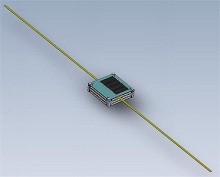Swarm Technologies Suspected Of Illegally Launching Unlicensed CubeSats on Indian Launch Vehicle - 3 of 3 Parts
Part Three of Three Parts (Please read Part One and Part Two first)
In mid-January of this year, a Polar Satellite Launch Vehicle (PSLV) was launched from a launch facility on the eastern coast of India. The primary payload of the PSLV consisted of big Indian mapping satellite. As is often the case with commercial launches these days, dozens of tiny satellites known as CubeSats were packed in around the big mapping satellite. Planetary Resources, a Seattle-based asteroid mining company contributed a CubeSat to test prospecting tools for asteroid mining. Telesat is a Canadian company which added a communications Cubesat to the payload. Carbonite, a British company, sent a Cubesat in the launch to take high-definition video of the surface of the Earth. And many more Cubesat from other companies rode the PSLV into orbit.
There were four Cubesats launched by the PSLV that raised some serious questions. The These Cubesats were named SpaceBee-1,2,3, and 4. The Indian Space Research Organization (ISRO) which operates the launch facility and launched the PSLV described the four satellites as “two-way satellite communication and data relay” devices from the United States. No organization was listed as the operators of the satellites. All the ISRO had to say about those four CubeSats beyond the brief description was that they reached orbit successfully.
The IEEE Spectrum has identified Silicon Valley startup named Swarm Technologies founded in 2016 as the owners of the four mysterious CubeSats. Apparently the SpaceBee satellites were constructed and launched to demonstrate technology for a new space-based Internet of Things communication network.
Swarm says that its new network based on the SpaceBee satellites could reduce the cost of satellite communications by orders of magnitude over current technology. The Swarm system should be able to provide cheap world wide tracking of ships, cars, truck and rail cars, enable new agricultural technologies, and lower the cost of connectivity for “humanitarian” efforts anywhere on Earth. The four SpaceBee satellites are intended to be the first practical demonstration of Swarm’s “prototype hardware and cutting-edge algorithms. They have the capability to exchanged data with ground stations for up to eight years.
The reason that the launch of the SpaceBee satellites is of interest is the fact that the Federal Communications Commission (FCC) had rejected Swarm’s application for its experimental satellites at the end of 2017 on the grounds of safety concerns. The FCC feared that the SpaceBee satellites would pose a serious risk of collision with other spacecraft in Earth orbit. If the SpaceBee satellites are really the experimental satellites constructed by Swarm, it will be the first case of the unauthorized launch of commercial satellites in history.
The FCC has notified Swarm that it was going to investigate “the impact of the applicant’s apparent unauthorized launch and operation of four satellites… on its qualifications to be a Commission licensee.” Unless Swarm can convince the FCC that the launch of the SpaceBee satellites do not pose a risk to other spacecraft, the FCC may not issue the company permission for future launches. On the other hand, there are other countries such as India that will launch future Swarm satellites regardless of rulings by the FCC.
If the SpaceBee satellites were launched illegally, that would call into question the ability and the willingness of secondary satellite “ride-share” companies and foreign launch to comply with U.S. space regulations. It is unclear exactly what would happen to the international space industry if it bifurcated into U.S. authorized and unauthorized foreign launch facilities.
SWARM Technology SpaceBEEs:
